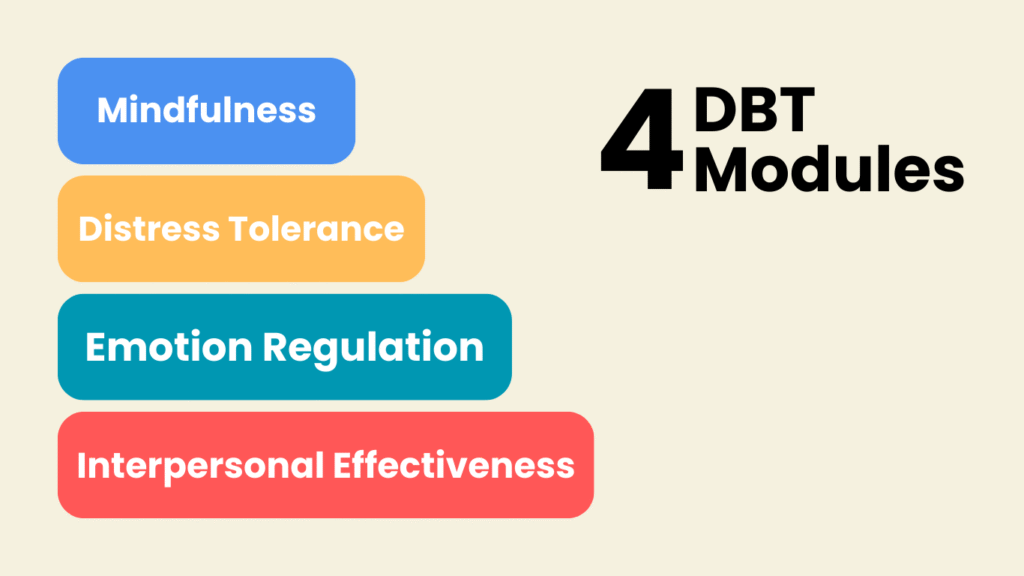Dialectical Behavior Therapy – Atlanta, GA

Are you feeling overwhelmed by intense emotions? Do you find yourself reacting impulsively, struggling to maintain healthy relationships, or just feeling like your mental health is constantly challenged?
You’re not alone, and there’s hope. At MARR Treatment Centers, we understand these struggles and offer a powerful, evidence-based therapy to help you regain control and build a life worth living. Our Dialectical Behavior Therapy – Atlanta, GA, can give you back control over your emotions.
What is Dialectical Behavior Therapy?
Dialectical Behavior Therapy (DBT) is a type of cognitive behavioral therapy (CBT) that Marsha Linehan originally developed to treat borderline personality disorder (BPD). Since then, it has been proven effective for a wide range of mental health conditions, especially those involving difficulty managing intense emotions, impulsive behaviors, and relationship challenges. More and more adolescents and young adults are finding success using DBT.
The Core Principles
So, what makes DBT different? The word “dialectical” means finding a balance between two seemingly opposite ideas. In DBT, this means accepting yourself as you are right now (with all your struggles) while also actively working towards change and growth. It’s about finding the middle path.
DBT focuses on teaching you practical coping skills in four key areas, often referred to as modules:
- Mindfulness: Learning to be fully present in the present moment without judgment.
- Distress Tolerance: Developing ways to cope with painful emotions and stressful situations without resorting to self-destructive behaviors like self-harm.
- Emotion Regulation: Understanding your emotions, reducing vulnerability to intense emotions, and changing unwanted thought patterns.
- Interpersonal Effectiveness: Improving your communication skills to build healthier relationships and meet your needs.
How DBT Works at MARR Treatment Centers
MARR Treatment Centers offers comprehensive DBT treatment to meet your unique needs. Our DBT program typically includes several components working together:
- Individual Therapy: One-on-one sessions with a trained DBT therapist to address your specific challenges, track your progress, and personalize your treatment plan.
- DBT Skills Group: A supportive environment where you learn and practice DBT skills with others who understand what you’re going through. A DBT skills group is invaluable to recovery.
- Phone Coaching: Access to brief phone coaching with your therapist between sessions to help you apply your skills in daily life.
- Family Therapy (when appropriate): Involving your loved one in the treatment process to improve communication and support your recovery.
These modalities within DBT therapy allow clinicians to treat a variety of disorders and situations that may be causing mental distress.

The Four DBT Modules in Detail
Let’s dive deeper into each of the four DBT modules and how they can help you:
1. Mindfulness: Finding Peace in the Present
Mindfulness is the practice of paying attention to the present moment without judgment. It’s about observing your thoughts, feelings, and sensations without getting carried away.
How Mindfulness Helps:
- Reduces stress and anxiety
- Increases self-awareness
- Improves focus and concentration
- Helps you appreciate the simple things in life
Mindfulness Skills Examples:
- Observing: Noticing your thoughts and feelings as they arise without trying to change them.
- Describing: Putting words to your experiences (“I’m feeling anxious,” rather than just “I feel bad”).
- Participating: Fully engaging in an activity, paying attention to the details.
2. Distress Tolerance: Surviving a Crisis
Distress tolerance skills are designed to help you get through difficult moments without making things worse. These skills are essential when you feel overwhelmed and tempted to engage in harmful behaviors.
How Distress Tolerance Helps:
- Prevents impulsive reactions
- Reduces self-harm
- Provides temporary relief from intense emotions
- Helps you survive a crisis until you can use other skills
Distress Tolerance Skills Examples:
- Distraction allows you to engage in activities that take your mind off the pain (e.g., watching a movie, reading a book, or spending time with friends).
- Self-soothing involves using your senses to comfort yourself (e.g., taking a warm bath, listening to calming music, or using aromatherapy).
- Improving the moment helps you find small ways to make the present situation more bearable (lighting a candle, drinking a cup of tea, stretching).
- Radical acceptance means accepting reality as it is, even when it’s painful (this doesn’t mean you have to like it, but it does mean you stop fighting it).
3. Emotion Regulation: Mastering Your Feelings
Emotion regulation skills teach you to understand, manage, and change emotions. These skills are crucial for reducing emotional suffering and building a more stable emotional life.
How Emotion Regulation Helps:
- Increases awareness of your emotions
- Reduces emotional vulnerability
- Changes unwanted emotions
- Increases positive emotions
Emotion Regulation Skills Examples:
- Identifying and Labeling Emotions: Recognizing what you’re feeling and giving it a name.
- Understanding the Function of Emotions: Learning why you feel the way you do.
- Reducing Vulnerability to Emotional Mind: Taking care of your physical health (sleep, nutrition, exercise) to make yourself less susceptible to emotional swings.
- Increasing Positive Emotions: Engaging in activities that bring you joy and pleasure.
4. Interpersonal Effectiveness: Building Healthy Relationships
Interpersonal effectiveness skills focus on improving your communication and relationship skills. These skills help you assert your needs, set boundaries, and resolve conflicts in a healthy way.
How Interpersonal Effectiveness Helps:
- Improves communication skills
- Increases assertiveness
- Strengthens relationships
- Reduces conflict
Interpersonal Effectiveness Skills Examples:
- DEAR MAN: A skill for asking for what you need assertively.
- GIVE: A skill for maintaining relationships during conflict.
- FAST: A skill for maintaining self-respect.
Who Can Benefit from DBT?
While DBT was initially developed for borderline personality disorder, it has since been proven effective for a wide range of conditions, including:
- Depression
- Anxiety Disorders
- Eating Disorders
- Substance Abuse
- OCD
- ADHD
- Self-Harm
- Impulsive Behaviors
- Relationship Problems
DBT might be the right choice if you struggle with these issues.
DBT and Co-Occurring Disorders
DBT can be particularly helpful when addressing co-occurring disorders, such as substance abuse and mental health issues. For example, someone struggling with addiction may also experience intense emotions and impulsive behaviors that contribute to their substance use.
DBT can provide them with the coping skills to manage these emotions and make healthier choices.
What to Expect in a DBT Session
DBT sessions are typically structured and goal-oriented. In individual therapy, you’ll work with your DBT therapist to identify your goals, track your progress, and address any challenges you face. You’ll also review your homework assignments and practice using DBT skills in real-life situations.
In the DBT skills group, you will learn and practice new skills with other group members. The group leader will guide you through exercises and provide feedback.
Radically Open DBT (RO DBT)
Radically Open DBT (RO DBT) is another form of DBT that addresses the challenges of overcontrol. This treatment is tailored for disorders such as chronic depression, avoidant personality disorder, and eating disorders such as anorexia. RO DBT aims to promote openness, flexibility, and social connectedness.

Is DBT Right for You?
If you’re struggling with intense emotions, impulsive behaviors, or relationship difficulties, DBT may be a good fit. It’s a powerful, evidence-based therapy that can help you build a more fulfilling and meaningful life.
Finding a DBT Therapist in Atlanta, GA
If you’re interested in pursuing DBT therapy, finding a qualified DBT therapist is essential. Look for a therapist trained in DBT who has experience treating your specific concerns. Many LPCs and LCSWs are trained in DBT practices.
Make MARR Your Choice
MARR Treatment Centers is dedicated to providing compassionate and effective mental health treatment. Our DBT program is led by experienced clinicians passionate about helping individuals reach their full potential. We believe in a holistic approach to wellness, addressing not only your mental health but also your physical and emotional well-being.
DBT Programs at MARR
Here’s how we incorporate DBT into our various programs:
- Addiction Treatment: DBT helps individuals manage cravings, cope with withdrawal symptoms, and develop healthier coping mechanisms to prevent relapse.
- Mental Health Programs: DBT is a core component of our mental health programs, addressing conditions like depression, anxiety, eating disorders, and borderline personality disorder.
- Adolescent and Young Adult Programs: We tailor DBT to meet the unique needs of adolescents and young adults, helping them navigate the challenges of this developmental stage.
DBT is integrated throughout our programs. Here is an example of how we would use the modules:
- Mindfulness: Practicing mindfulness skills to increase self-awareness and reduce impulsivity. We may also integrate aspects of EMDR.
- Distress Tolerance: Learning distress tolerance skills to cope with cravings, withdrawal symptoms, and other challenging emotions without turning to substances.
- Emotion Regulation: Developing emotion regulation skills to manage intense emotions and reduce emotional reactivity.
- Interpersonal Effectiveness: Improving communication skills to build healthier relationships and seek support from others.
We offer in-person and outpatient DBT options.
Take the First Step Toward Control
If you’re ready to take control of your life and build a brighter future, we encourage you to contact MARR Treatment Centers. Our compassionate team is here to answer your questions, assess your needs, and help you determine if DBT is the right choice for you. Remember, you don’t have to struggle alone. There is hope, and we’re here to help you find it.
Call us today at (678) 805-5100 to learn more about our DBT program and how we can support your recovery and mental health journey. Your path to a life worth living starts here.
